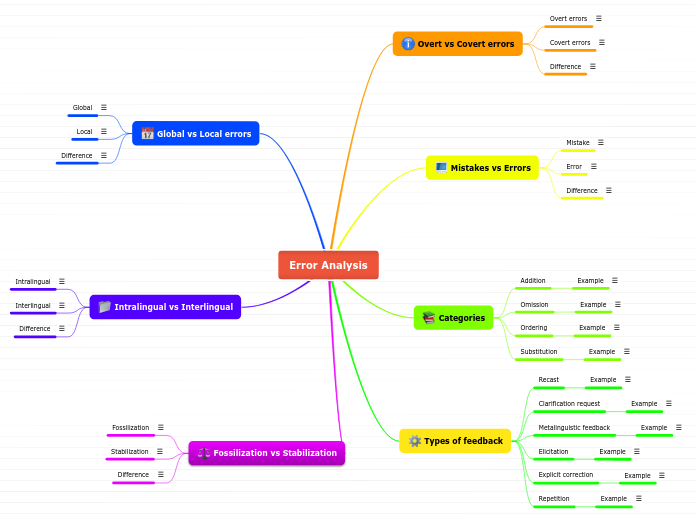von ADA LUCIA ASENCIO RIVERA Vor 4 Jahren
1348
Error Analysis

von ADA LUCIA ASENCIO RIVERA Vor 4 Jahren
1348

Mehr dazu
Type in the name of your subject.
The main difference between fossilization and stabilization is permanence and the causes.
Add detailed notes about each lecture, so that when the time comes to prepare for exams, you will have an easier and quicker overview.
Main difference is the language transfer, intralingual is within the second language, and interlanguage is with the native language.
Schedule your course ahead. Knowing all the information will make everything easier.
Global errors affect comprehension whereas local erros do not.
Add the class information for each week.
S: I did my bed this morning
T: I did?
S: She have three sisters.
T: I, you, we and they use have, she, he or it, use has.
S: She have three sisters.
T: She... try again please.
S: She has three sisters.
S: She have three sisters.
T: Do we use have or has with third person singular?
S: She has three sisters.
S: He take the bust to go to school
T: Pardon me?
S: I did my bed this morning
T: Oh, you made your bed this morning.
Add key information about the books you've read. If you feel it's necessary, you can add a small summary of your readings in the Notes section.
I need to know where is the bank?
Add summary of the content of a book
Review your resource requirements and tick off the devices you will need as well as their availability. Add others, if necessary.
The difference between them is that mistakes have to do with the performance and errors with the system of the learners.
Add other resources:
Select as needed:
Type in all the info you would like to know about this subject. If there is something you don't know yet, no problem! You can fill in the blanks along the way.
Main difference between overt and covert errors is that they play a different role when doing an error analysis, one overt errors are systematic and covert are idiosyncratic.
Type in the name of your teachers and teacher assistants, plus any details you should know about them.
Add details about your course.